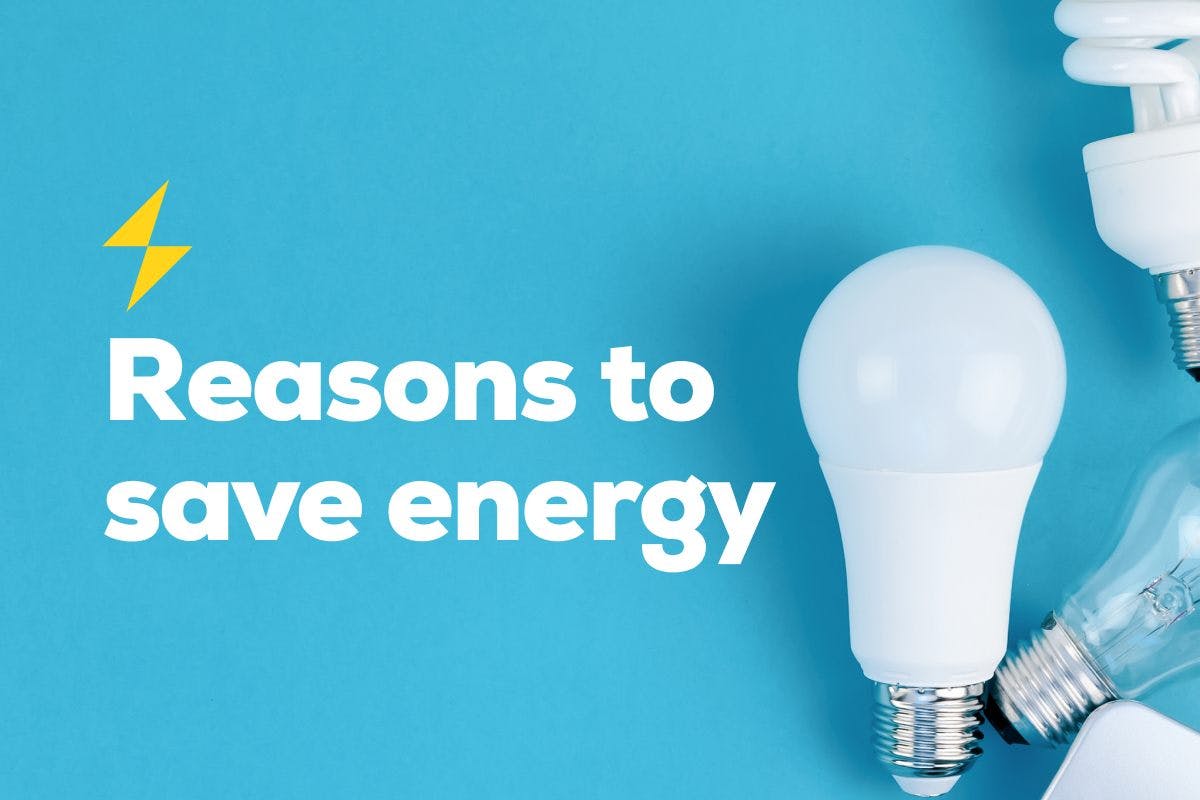If you’re looking for a reason to save energy, money is usually a good one. When energy conservation can directly save you money on your monthly electricity bill, reducing electricity usage at home is a logical financial decision. A matter of dollars and sense.
But of course, money isn’t everything, and there are many other reasons to save energy.
See how much you can save with home energy changes
Why Save Energy?
Wasted energy is generally a bad thing, no matter the subject.
While conserving energy can be the key to success in running marathons, having a productive work week, and many other scenarios, reducing your energy consumption is even more important when talking about electricity.
With global implications and a wide variety of benefits, here are four of the most important reasons to save electrical energy:
1. Energy Conservation is Resource Conservation
Most importantly, wasted energy translates directly into wasted resources.
So much of the energy that we use today is produced by finite materials, and every bit of power that can be saved equates to a small amount of the earth’s resources that will not be used to create new electricity.
Whether it is coal, natural gas, or nuclear energy, large portions of the global electricity supply are powered by physical elements that are mined from limited reserves. Plus, even renewable energies like solar and wind require system components that are built from the finite materials found on earth.
Therefore, energy conservation is critical to ensure ongoing access to electricity in all forms.
2. Improved Air and Water Quality
According to the US Energy Information Administration, fossil fuels made up over 60% of United States electricity generation in 2021. While there has been significant growth in new solar and wind capacity, natural gas and coal are still the country’s top two most used fuels to generate electricity nationwide.
Therefore, it is more than likely that using a grid-supplied electricity source will have a negative effect on local air quality. Although natural gas is much more “clean burning” in comparison, coal and other fossil fuel power plants emit significant amounts of nitrogen oxides, sulfur dioxide, mercury, methane, and other hazardous air pollutants (HAPs) in the electricity production process.
On top of this, coal-fired power plants also release particulate matter, which can lead to smoke, smog, and even ash being released into the air and affecting human health. Energy-saving measures help reduce unnecessary emissions from these fossil fuel sources, leading to less overall risks for air and water pollution.
3. Reduced Effects of Climate Change
In addition to cleaning up the local air quality, reducing energy usage can also help negate the effects of climate change. From sourcing materials to burning fuels and using electricity, energy conservation helps limit the effects of climate change at many different levels.
To start, energy resource mining leads to habitat loss and destruction, just as it does in deforestation, urban sprawl, and other human activities. With habitats destroyed and biodiversity lessened, it will become increasingly difficult to maintain healthy natural ecosystems in areas that are being exploited for energy production.
Most importantly, curbing fossil fuel energy use and reducing your carbon footprint can help limit the amount of greenhouse gasses that enter the atmosphere and contribute to global warming. As a global community, limiting energy usage to avoid accelerated carbon dioxide levels in the atmosphere can help lessen the frequency, intensity, and effects of heat waves, droughts, rising sea levels, and other natural disasters.
4. Creating a Better Overall Quality of Life
With both sea levels and electricity prices rising from increased global power consumption, saving energy is a catch-all solution for a better future. If clean air, drinkable water, and affordable energy prices from a balanced supply and demand indicate a good quality of life to you, then reducing your energy consumption (and encouraging others to do the same) can help make this a reality for everyone.
See how much you can save with home energy changes
How To Conserve Energy
Now that we know there are many compelling reasons to save energy, besides just saving money, it’s time to put some tangible action items in place that you can use to conserve energy.
Everyone can save energy. Whether you use electricity at home, work, or on-the-go, individuals have the ability to both control their own power use, and influence how the world around them consumes energy.
While it never hurts to write to your local congress members and demand action, here are four energy-saving pillars you can apply to your own life, with dozens of energy-saving tips and tricks to keep in mind and implement wherever possible:
1. Adapt an Energy-Saving Mindset
First and foremost, energy conservation is a state of mind. Reducing energy use should be planned in both the short and long term, with thoughtful consideration of daily and ongoing electricity consumption.
A great way to start is by looking at your energy bills, or having a home energy audit conducted. The process of analyzing your energy use is an excellent first step while your mind adjusts to its new, conservational outlook.
With reducing your energy use as a constant goal, unique solutions may begin to present themselves in nearly every aspect of your life, from food sourcing to home lighting, brand choices, and more. By simply considering alternative energy choices, you can help significantly lower your total potential electrical consumption.
2. Prevent Waste and Actively Manage Energy Consumption
Backed by a conservation-minded approach, preventing waste and actively managing your electrical consumption at home is both a passive and active way to reduce energy usage. If you choose to conduct an energy efficiency audit, there may be many things that you can do to improve the ways in which power is used in your building.
As heating systems and cooling systems typically make up a large portion of a home's energy consumption profile, preventing waste can usually be achieved by improving the building’s envelope to retain interior temperatures. Heating, ventilation, and air conditioning (HVAC) systems consume less energy in ideal conditions, and audits may lead to:
- Improving a home’s insulation
- Finding and eliminating any major or minor air leaks to prevent heat loss
- Upgrading doors and windows to be more energy efficient
- Cleaning vents and air ducts
- Replacing HVAC air filters
- Installing a smart thermostat
- Replacing your air conditioner with a heat pump
Inside the home, smart management of electricity use is largely dependent on personal habits. To ensure that everything is turned off when not in use, electronic devices and appliances can be managed with power strips, or even attached to smart home outlets with app-control or timers for automatic use.
3. Intelligently Utilize Energy Efficient Appliances
In addition to HVAC systems, home appliances like dishwashers and laundry machines tend to also make up a large portion of a home's energy consumption profile. Manufacturers know this, which is why newer appliances tend to be more efficient than older models, as consumers are looking for energy-efficient solutions to minimize ongoing energy costs.
If you’d like to save energy, a great way to start is by replacing any old, inefficient appliances.
When shopping for new devices, make sure to look for Energy Star ratings, and consider how much a device will cost to run, in addition to the upfront purchase price. While not everyone can afford to replace large appliances right away, subbing out old light fixtures for efficient LED bulbs is a low-cost option for instant results.
Whether or not you purchased the most efficient appliance on the sales floor, there are also several smart habits to keep in mind for ongoing energy conservation. These include:
- Only running full loads in the dishwasher or laundry
- Always clearing the dryer lint and considering air-drying clothes when possible
- Taking advantage of cold water settings and “eco-mode” options
If you’d like to save money while running your appliances, it is also important to pay attention to electricity Time of Use rates. In many parts of the county, it may be cheaper to run high-energy appliances during “off-peak” hours, when utility electricity rates are lower.
4. Save Energy with Great Habits
As you can see, with the right mindset, actions, and equipment, saving energy at home is all about developing great habits. Without sacrificing the quality of life that you are comfortable with, it is possible to make minor changes to reduce energy use every single day.
Although everyone’s consumption profile is different, here are a handful of things that most people can do to conserve electricity at home:
- Consider raising the room temperature when running the air conditioning
- Consider raising the fridge and freezer temperatures within safe parameters
- Consider lowering your hot water heater temperature to save on water heating costs
- Never leave your TV or other devices running all night
- Turn your computer completely off when not in use
- Remove rechargeable batteries from power sources once they are full
- Manage the light and heat in your home with curtains and blinds
- Dress appropriately (or grab a blanket) rather than turning the heat up
- Utilize a wood-burning stove or fireplace in the winter
For more information on how to save electricity at home, we recommend checking out the US Department of Energy’s 40-page guide to residential energy saving.
Energy Conservation and Renewable Energy
To reduce the amount of energy you purchase and consume from the power grid, generating your own electricity is now possible by going solar at home. By producing emission-free energy on-site, residential solar energy systems help homeowners reduce their fossil fuel consumption for decades, all while avoiding the rising prices of utility electricity.
So… does solar power mean you can use as much energy as you want?
While solar power can certainly help reduce the financial and environmental guilt of electricity consumption, using clean energy does not make electrical conservation any less important. With a rooftop solar system, energy efficiency on a property makes your personal power source go even further, and many homeowners can be compensated for any excess energy production.
Whenever solar energy is generated and sent to the grid, it can then be used by anyone in the neighborhood. By limiting your consumption of a personal or shared renewable energy resource, this leaves more clean power available to be used by other electrical users in place of destructive fossil fuels.
Conclusion: Save Energy and Create Your Own
At the end of the day, reducing your energy usage is important, as it can allow you to make a small impact on world resource conservation, healthy air and water supplies, and ongoing quality of life.
Of course, energy-saving appliances and habits can help you spend less money on your electrical bills and purchase less power from the utility. To save even more, homeowners can now consider a personal solar energy system to generate their own electricity and lower their dependence on grid power supplied by fossil fuels.
Want to see how much you can save?
Try Palmetto’s Free Solar Design and Estimate Tool to design your own clean energy system, save energy, and install a better quality of life.
See what home electrification can do for you:
 Cory O'BrienSenior Director - Growth Marketing
Cory O'BrienSenior Director - Growth MarketingCory brings over 8 years of solar expertise to Palmetto, and enjoys sharing that knowledge with others looking to improve their carbon footprint. A dog lover residing in Asheville, NC with his wife, Cory graduated from UCSB. If you run into him, ask him about the company he founded to rate and review beer!

